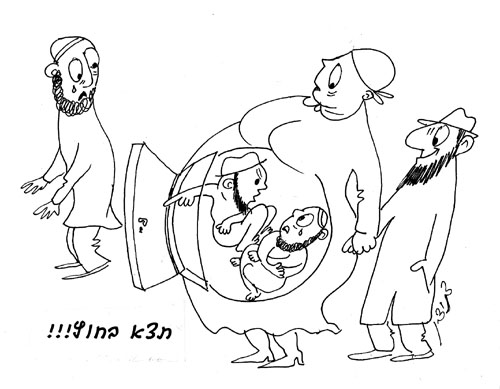
The sages ruled that a woman who has been widowed may not remarry immediately, but must wait three months from her husband’s death before remarrying. The reason for this is that the widow may be pregnant by her late husband and people may err and think the child to be her new husband’s. Three months is sufficient time to know whether the widow is pregnant from her first husband, for after three months her pregnancy can be seen. The scholars asked: It should be sufficient to wait only a few days after the death of her first husband. Then she could get remarried, and three months after the death of her first husband her belly and her breasts, which show pregnancy-related changes after three months, could be checked. If they do indeed show such changes, then she is pregnant by her first husband. Answer: Since she is married, it is inappropriate and an embarrassment to her if others examine her, with her belly and her breasts exposed to them. The scholars went on to ask: There is a modest way to check whether she is pregnant. She should walk over loose moist sand, for the steps of a pregnant woman are heavier, and this can be seen in her footprints. Answer: This examination is not efficient in this case, for women would hide a pregnancy from their first husband so people would think the child the second husband’s and thus the child could be an heir to his property. Therefore the woman would try to walk lightly, like a woman without a fetus in her belly, so that none could discover her pregnancy.
The scholars went on to ask: If the reason for waiting three months from her husband’s death is to know if she is pregnant by him, in a case where it is known that she is pregnant, she should be able to wed even before the three months are up. Why did the early sages rule that a man should not wed a pregnant widow or divorcee? Answer: The early sages forbade marrying a pregnant woman lest she become pregnant again during her pregnancy and the new fetus press upon the older and cause it harm. The scholars asked: Then each man should be forbidden to have sexual relations with his pregnant wife lest she become pregnant again and cause harm to the older fetus. Answer: The fear is not that she will become pregnant again, because we rely upon G-d to have mercy and protect the fetuses. The fear is that the second husband will cause harm to the fetus during sex. The scholars asked: Any husband could cause damage to a fetus if he has sex with his pregnant wife. Answer: When the husband is the father of the fetus he is careful not to harm the fetus, but when the husband is not the father of the fetus he is not as careful and there is fear the fetus will be harmed. The scholars went on to ask: It is reasonable to suppose that every man will be careful not to harm a fetus during sex, even if the fetus is not his, for this is a capital matter. The scholars gave a different answer to explain why the early sages forbade marrying a pregnant woman: the pregnant woman will in the future nurse her newborn child, and if she remarries she might become pregnant immediately after giving birth. This new pregnancy will sour her milk and she will not be able to nurse, causing the death of the newborn child of her first husband. The scholars noted that each husband ought to be forbidden to have sexual relations with his wife after childbirth, lest she become pregnant again immediately and her milk sour. Answer: In such a case the mother could feed the infant with substitutes — eggs and milk. The scholars continued to ask: Then she could do the same if she became pregnant by her husband after the birth of her child by her first husband, and feed the infant substitute foods. Answer: Her second husband, who is not the father of the infant, will not agree to pay for the infant’s food. The scholars then asked: The mother could sue the heirs of her first husband for money to buy substitute foods. Answer: A woman is embarrassed to go to court and sue the heirs for money, so she will not have the wherewithal to buy the infant food, and the infant will die.
(Babylonian Talmud, Tractate Yevamot 42a-b)
